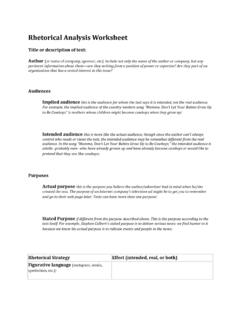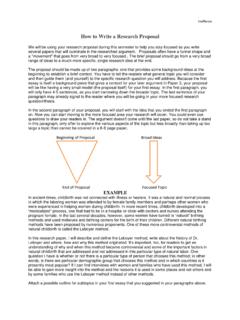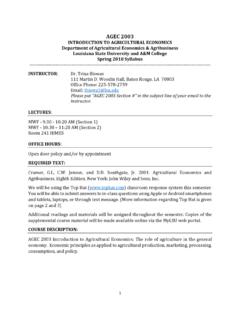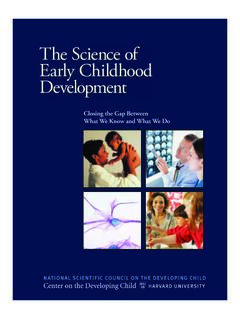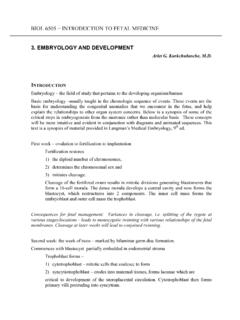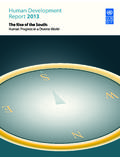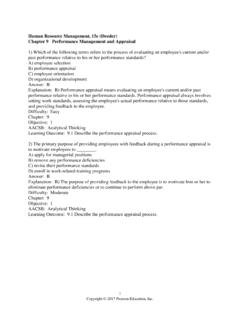Transcription of ENVS 1126 Introduction to Environmental Sciences - lsu.edu
1 1 envs 1126 Introduction to Environmental Sciences FALL 2015 (3 credits, Section 1) Catalog Statement: Essential principles of Environmental Sciences ; comprehensive and fundamental understanding of sound science, stewardship, and sustainability in Environmental Sciences ; interactions and relations between humans and earth; an up-to-date look at today s global, national, and regional Environmental issues. Instructor: Dr. Aixin Hou Office: 1255 Energy, Coast, and Environment Bldg. Telephone: 578-4294 Email: (the recommended way to contact me) Office Hours: By appointment Course Meeting: Hours: MWF 9:30-10:20 Place: 103 Design Building General Education Credit: This course is available for General Education credit in the Natural Sciences , as a Life Sciences course. Course Objectives: Upon completion of this course, students will be able to: 1) Demonstrate knowledge of a broad survey in the discipline, including underlying principles that govern the natural world.
2 2) Demonstrate the ability to design and test a hypothesis by experimentation or other appropriate techniques. 3) Demonstrate an ability to relate the field of study to other fields in the Natural Sciences . 4) Demonstrate the ability to use inductive and deductive reasoning to understand scientific phenomena. Text: Richard T. Wright and Dorothy F. Boorse, Environmental Science: Toward a Sustainable Future 12e. Pearson Education, Inc. (2012) ISBN-13: 978-0-321-81153-0 Grading and Exams: Exam I: 20% Exam II: 20% Final Exam 35% Homework and Quizzes: 25% 2 Bonus activities: TBA Grading scale: A+ = - 100+, A = - , A- = , B+ = , B = , B- = , C+ = , C = , C- = , D+ = , D = , D- = , F = 0 Two non-cumulative midterm exams and one cumulative final exam will be given during the semester. Each exam will consist of true/false, multiple choice, fill-in-the-blanks, and short essay questions.
3 Homework and Quizzes: Either 20 homework assignments or daily in-class quizzes will be given for class credit depending on a class vote. The vote will be taken in class on Friday, August 28. Homework assignments would be given out on a nearly weekly basis and would be due one week after it is assigned. In-class quizzes would be given either in the beginning of the class based on assigned reading materials or at the end of the class based on the lecture. Bonus activities: During the course of the semester, bonus points will be available for completing activities during and/or outside of class. Bonus points will be added to the total points in determining the student's grade. Course Outline: Date Topic a Readings b WK1 8/24 Course Introduction 8/26 Science and the Environment Ch. 1 8/28 Ecology I: Organisms and Environmental Factors Ch. 3 WK2 8/31 Ecology II: Matter Cycling and Energy Flow (1) Ch.
4 3 9/2 Ecology III: Matter Cycling and Energy Flow (2) Ch. 3 9/4 Ecology IV: Populations and Communities Ch. 4 WK3 9/7 No Class: Labor Day 9/9 Ecology V: Ecosystems- Patterns and Energy Ch. 5 9/11 Ecology VI: Ecosystems- Disturbance Ch. 5 WK4 9/14 Ecology VII: Ecosystems- Value, Use, and Restoration Ch. 7 9/16 human Ecology I: Population (1) 9/18 human Ecology I: Population (2) WK5 9/21 human Ecology II: development 9/23 Review for Exam 1 9/25 Exam 1 WK6 9/28 Biological Resources 9/30 Water Resources 10/2 Soil Resources 3 Date Topic a Readings b WK7 10/5 Energy Sources I: Fossil Fuels 10/7 Energy Sources II: Nuclear Power 10/9 Energy Sources III: Renewable Energy WK8 10/12 Environmental Hazards and human Health 10/14 Global Climate Change I: Causes 10/16 Global Climate Change II: Consequences and Responses WK9 10/19 Air Pollution Ch. 19 10/21 Ozone Depletion 10/23 Review for Exam 2 WK10 10/26 Exam 2 10/28 Introduction to Water Pollution 10/30 No Class: Fall Holiday WK11 11/2 Eutrophication 11/4 Hypoxia in the Gulf of Mexico Ppt lecture 11/6 Mercury Cycling in Aquatic Ecosystems Ppt lecture WK12 11/9 Influence of Hurricane Katrina on Water Quality Ppt lecture 11/11 Oil Pollution Ppt lecture 11/13 The Deepwater Horizon Oil Spill in the Gulf of Mexico Ppt lecture WK13 11/16 Wetland Restoration in Coastal Louisiana: Causes of Land Loss and Approaches of Restoration Ppt lecture 11/18 Municipal Solid Wastes 11/20 Hazardous Chemicals WK14 11/23 Agriculture and the Environment I ,13 11/25 Agriculture and the Environment II ,13 11/27 No class: Thanksgiving Holiday WK15 11/30 Toward a Sustainable Future.
5 Economics, Public Policy, and the Environment 12/2 Sustainable Communities and Lifestyles 12/4 Review for Final Exam WK16 12/11 Final Exam (7:30 - 9:30 AM) a The exact dates and coverage of topics may vary. b Supplementary readings will be provided periodically in addition to denoted chapters in textbook. 1/6/2016 9:20:09 AM Page 1 of 4 Syllabus for Introduction to Environmental Sciences , Fall 2015 (3 credits, Section 03) Catalog Statement: Essential principles of Environmental Sciences ; comprehensive and fundamental understanding of sound science, stewardship, and sustainability in Environmental Sciences ; interactions and relations between humans and earth; an up-to-date look at today s global, national, and regional Environmental issues. Instructor: Dr. Crystal N. Johnson 2283 Energy, Coast, and Environment (ECE) Bldg, 225-578-9422, (email is the best way to contact me). Office hours are by appointment.
6 Course Time Slots: Hours: (Asynchronous); Location: Exclusively online; there will be no meetings in person, unless requested by student. A webcam and a dependable internet connection will be required for all exams unless taken in the LSU Testing Center. General Education Credit: This course is available for General Education credit in the Natural Sciences , as a Life Sciences course. Course Objectives: Upon completion of this course, students will be able to: 1) Demonstrate knowledge of a broad survey in the discipline, including underlying principles that govern the natural world. 2) Demonstrate the ability to design and test a hypothesis by experimentation or other appropriate techniques. 3) Demonstrate an ability to relate the field of study to other fields in the Natural Sciences . 4) Demonstrate the ability to use inductive and deductive reasoning to understand scientific phenomena.
7 Text: Richard T. Wright, Environmental Science: Toward a Sustainable Future 12th ed. Grading and Exams: 1. Exam I (5 essay questions worth 20 points each, for a total of 100 points; 30 minutes) 2. Exam II (5 essay questions worth 20 points each, for a total of 100 points; 30 minutes) 3. Semi-cumulative Final Exam (5 essay questions worth 20 points each, for a total of 100 points; plus 10 additional fill-in-the-blank questions worth 3 points each for a total of 30 additional points; one hour) 4. Homework Questions (~160 points, 2 multiple choice questions per lecture, 2 points per question, ~40 lectures, one week to finish each homework assignment on Moodle) 5. 1 to 3 bonus points per weekly forum discussion on Moodle. There will be up to 15 discussions this semester. Points earned from forum discussions will be accumulated and added to final score. There will be a maximum of 25 bonus points per student per semester.
8 The sum total for the semester is ~490 points. Grading scale: A+ = - 100+ ; A = - ; A- = ; B+ = ; B = ; B- = ; C+ = ; C = ; C- = ; D+ = ; D = ; D- = ; F = 0 Course Outline (the exact dates and coverage of topics may vary): LECTURES HOMEWORKS Date on which to listen Subject (Note that all times are in Central Daylight Time) Chapters, Material Week # Dates covered by HW assignments Homework assignments due on Mondays at 9:00 AM CDT 8/24/2015 Introduction to basic concepts needed for this course Ppt lecture Week 1 8/26/2015 Introduction to science and the environment, Basic needs of living things (A) 1, 3 8/28/2015 Introduction to science and the environment, Basic needs of living things (B) 1, 3 8/31/2015 Populations and communities (A) 4 Week 2 1/6/2016 9:20:09 AM Page 2 of 4 9/2/2015, Last day to add Populations and communities (B) 4 9/4/2015 Paper to be discussed 9/7/2015 Labor Day Week 3 8/24 - 8/28 HW1 due 9/9/2015 The human population 8 9/11/2015 Ecosystems 5 9/14/2015 Paper to be discussed Week 4 8/31 - 9/4 HW2 due 9/16/2015 Value, use, and restoration of ecosystems 7 9/18/2015 Weather and atmospheric pollution 5, 19 9/21/2015 Wild species and biodiversity 6 Week 5 9/7 -9/11 HW3 due 9/23/2015 Paper to be discussed 9/25/2015 TED talks 9/28/2015 Production and distribution of food 12 Week 6 9/14 - 9/18 HW4 due 9/30/2015 Ozone and food supply pdf, Ppt lecture 10/2/2015 Exam I can be taken at any time between September 30 at 5:00 AM and October 6 at 11:59 PM, and it must be completed by October 6 at 11.
9 59 PM 10/5/2015 Wetlands 6, Ppt lecture, Chapter scan Week 7 9/21 - 9/25 HW5 due 10/7/2015 Water: hydrologic cycle and human use (A) 10 10/9/2015 Water: hydrologic cycle and human use (B) 10 10/12/2015 Environmental hazards and human health (A) 17, Ppt lecture Week 8 9/28 - 10/2 HW6 due 10/14/2015 Environmental hazards and human health (B) 17, Ppt lecture 10/16/2015 Hazardous chemicals 22 10/19/2015 (midterms due Oct. 20) Kannan, bottlenose dolphins 11, pdf, Ppt lecture Week 9 10/5 - 10/9 HW7 due 10/21/2015 Soil 11 10/23/2015 Paper to be discussed 10/26/2015 human Genome video Ppt link Week 10 10/12 - 10/16 HW8 due 10/28/2015 Fall Break 10/30/2015 Water pollution, Wastewater management 20 11/2/2015 Waterborne human Pathogens Ppt Lecture Week 11 10/19 - 10/23 HW9 due 11/4/2015 Global climate change and your carbon footprint 18 11/6/2015 Paper to be discussed 11/9/2015 Microbial Ecology of Birds, Oysters, and Their Surrounding Environments Ppt lecture Week 12 10/26 - 10/30 HW10 due 11/11/2015 Municipal solid waste and recycling 21 11/13/2015 Paper to be discussed 1/6/2016 9:20:09 AM Page 3 of 4 11/16/2015 Exam II can be taken at any time between November 13 at 5:00 AM and November 19 at 11:59 PM, and it must be completed by November 19 at 11.
10 59 PM Week 13 11/2 - 11/6 HW11 due 11/18/2015 Pests and pest control 13 11/20/2015 Energy from fossil fuels 14 11/23/2015 Nuclear power (A) 15 Week 14 11/9 - 11/13 HW12 due 11/25/2015 Nuclear power (B) 16 11/27/2015 Thanksgiving 11/30/2015 Renewable energy 23 Week 15 11/16 - 11/20 HW13 due 12/2/2015 Urban sprawl/Urban blight 12/4/2015 Economics, Politics, and Public Policy 2 12/7/2015 11/23 - 12/4 HW14 AND 15 due 12/9/2015 Final Exam can be taken at any time between November 25 at 5:00 AM and December 9 at 11:59 PM, and it must be completed by December 9 at 11:59 PM. Note that you will have 1 hour to complete the Final. 12/15/2015 Final Grades will be posted before 9:00 AM. Details 1. Lectures Lectures will be posted on Moodle as narrated Powerpoint slides, and students will download and listen in presentation form. If there are any questions, simply ask by email.


